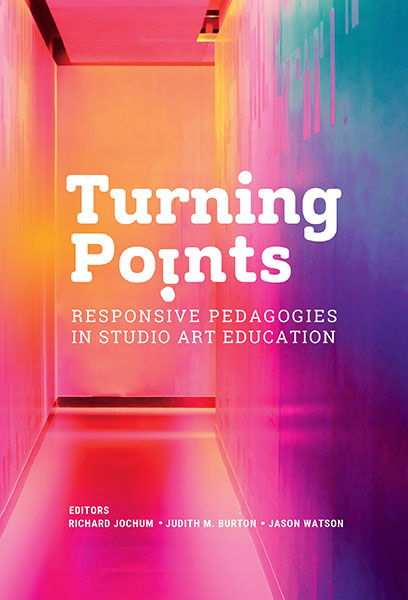Professors: Request an Exam Copy
Print copies available for US orders only. For orders outside the US, see our international distributors.
Edited by: Richard Jochum, Judith M. Burton, Jason Watson
Publication Date: October 27, 2023
Pages: 240

Turning Points invites readers to join in a dialogue about creating more responsive studio art pedagogies for all, following a global pandemic that forced art educators to do what many believed to be impossible: teach studio art online. Amidst this sudden shift, long-simmering social and political challenges pushed to the forefront, such as racial injustice, access to educational resources, economic inequality, and environmental degradation. As these issues compounded, art educators and art students navigated a radical shift in priorities—rethinking the materials, spaces, and relationships that form the foundation of the discipline. This collection of essays brings together international voices from across the field to share the lived experience of responsive teaching during the pandemic, and how we might rebuild a better educational ecosystem. Chapters address how new technologies, more inclusive spaces, and a heightened focus on relationships will reshape the studio art programs of the future.
Book Features:
Richard Jochum is a visual artist and an associate professor of art and art education at Teachers College, Columbia University. Judith M. Burton is Macy Professor of Education at Teachers College, Columbia University and recipient of the Lowenfeld Award for lifetime achievement in art education from NAEA. Jason Watson is a mixed-media artist and visual arts educator.
“What the writing in this book shows is that new thinking about how we teach and learn is a necessary outcome and task: generating a new paradigm for artful inquiry that embraces social justice, empathy, compassion, and care as values to help us all thrive.”
—Teachers College Record
“Turning Points offers hope amid the social crises that have dominated the last 3 years. These compelling accounts demolish decades of mind-numbing educational policies that preferred to measure deficit learning and what students do not know, rather than what students can be. Confronting uncertain futures and unknown realities is nothing new in the art studio. Turning Points offers abundant insight into art educators’ compassion, their belief in student capabilities, and how a deep sense of community diversity can be created in digital spaces. These ‘pedagogies of change’ are educational practices well within reach in our everyday lives and studios, whether facing present turmoil or questions not yet imagined.”
—Graeme Sullivan, past director, Penn State School of Visual Arts and author, Art Practice as Research: Inquiry in Visual Arts
“Pedagogical shifts in practice due to the pandemic, as shared by and among the art educators in this book, will certainly resonate with those who worked hard to teach well during this upheaval. Moving forward, now may be the time to entertain radical, even revolutionary, changes in graduate art education. The contributors show how the pandemic revealed deep and profound questions that call upon our ecological, social, political, industrial, and postindustrial pedagogical imaginations to rethink the value of art; what it means to be an artist; and how, where, and to what purpose graduate art education should take place.”
—Karen Lee Carroll, dean emeritus, Center for Art Education, Maryland Institute College of Art
Contents (FINAL)
Preface
Judith M. Burton ix
Part I: Studio Teaching During a Pandemic 1
Introduction
Richard Jochum and Jason Watson 3
Chapter 1: Pedagogy as Mentorship
Introduction
Paul A. C. Sproll 15
COVID-19 and What Became Visible
Iman Djouini 19
If We Speak, Do You Listen; If You Hear, Will You Respond?
Linnea Poole 22
Barriers Broken and Lessons Learned in Pandemic-Era Art and Design Education
Lynn Palewicz and Amanda Newman-Godfrey 25
Hyper-Personalized Mentorship as Essential Work
Megan Irwin 28
The Adventures of a Pandemic Graduate Student
Jessica Rohl 30
Mentoring as Pedagogy
Veronica Thomas 33
Chapter 2: Materials and Processes
Introduction
Aimée Ehrman 38
Dismissing the Myth of Scarcity in the Land of Plenty
Bill Gaskins 43
Pandemic Drawing: Marking in Public and Private
Sara Schneckloth 46
Rediscovering the Z in an X and Y World
Emma Quintana 49
High-Touch Practices in First-Year Design Studio Education During COVID-19
Kate O’Connor 53
If Studio Art Education Could Be Otherwise
Jun Gao 57
Chapter 3: Community and Relationships
Introduction
Rébecca Bourgault 65
Creating Community, Holding Space for Compassion in Times of Crisis
Jess Perry Martin 69
I Am . . . I Create . . . We Connect . . .
Carlos Arturo González-Barrios 72
Empathy Over Gatekeeping: Redefining the Contemporary Arts Student
Neil Daigle Orians 76
Home in/Is the Classroom: Building a Community of Artistic Citizens
Sabrina Marques 79
Chapter 4: International Perspectives
Introduction
José Galarza 83
Toward a Better Balance Between Onsite and Online Education
Sangbin IM 88
The Art Education Makerspace as a Responsive Teaching and Learning Arena
Rainer Wenrich 91
Challenges and Advantages of Post-Pandemic Art and Design College Education in Saudi Arabia
Dina Lutfi 95
The Shift—Off-Line
Rabeya Jalil 98
Interlude: A Conversation Between Judith M. Burton and Samuel Hoi 103
Part II: Road Maps for the Future 115
Introduction
Richard Jochum and Jason Watson 117
Chapter 5: Teaching Beyond the Art Studio
Ernesto Pujol 120
Chapter 6: Intercultural Education and Expanded Notions of the Studio
Tracie Costantino 132
Chapter 7: Learning How to Be a Teacher
Seph Rodney 141
Chapter 8: How to Be a Time Traveler: Possible Futures
Kimberly Sheridan 144
Chapter 9: Material Matters, Material Lives (Words of the Not-Yet, Right-Now)
Kaitlin Pomerantz 157
Chapter 10: Still to Come
Steven Henry Madoff 167
Chapter 11: Imagining Elsewise
Mick Wilson 181
Conclusion: Our Pandemic Pedagogies and How We Continue
Stacey Salazar 195
Afterword: The Immune System of Society: A Reflection on Art as a Defense Against Dangerous Ideas
Søren Obed Madsen 203
Index 215
About the Contributors 221
Professors: Request an Exam Copy
Print copies available for US orders only. For orders outside the US, see our international distributors.